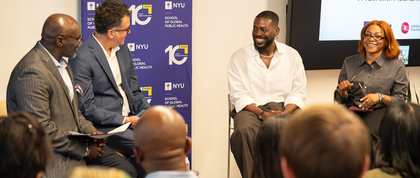
Singer-songwriter Adekunle Gold (second from right) visited NYU School of Global Public Health to launch a research collaboration, BEAT-SCD. He spoke with NYU professors Emmanuel Peprah (left) and Carlos Chirinos (second from left), along with Elizabeth Sobowale (right) of the Adekunle Gold Foundation. ©Jones: Courtesy of NYU Photo Bureau
The collaboration, BEAT-SCD (Building Engagement Through Music Artistry and Storytelling for Sickle Cell Disease), will explore the potential of music and storytelling to build trust, reduce stigma, and foster public engagement on the inherited blood disorder—and ultimately, to improve the lives of people living with it.
NYU professors Carlos Chirinos and Emmanuel Peprah and the Adekunle Gold Foundation launched the collaboration—among the first of its kind between a research institution and an internationally renowned music artist—on Thursday, Sept. 11, at the School of Global Public Health to highlight National Sickle Cell Awareness Month in the US. During a panel discussion, Gold spoke with students about his personal experience living with sickle cell disease.
"Sickle cell is tough, but if you let it stop you, it owns you. Sickle cell should never stop you—learn to manage your health, but don’t stop. My head is still filled with my dreams," the Nigerian-born artist told the audience.
Sickle cell disease, which affects nearly 8 million people worldwide, is a genetic disorder in which red blood cells become rigid and crescent-shaped. This makes it difficult for blood to flow and can lead to severe pain, anemia, infections, stroke, and even death. Sickle cell disease is most common in people of African, Mediterranean, Middle Eastern, and Indian descent; while 80 percent of cases occur in sub-Saharan Africa, the disease also affects patients globally with over 100,000 cases in the US.
Singer-songwriter Adekunle Gold visited NYU School of Global Public Health to launch a research collaboration, BEAT-SCD.